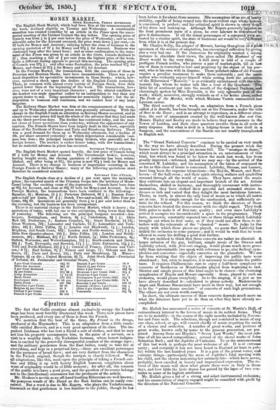Oritrts 311uou.
The fact that Gallic creations almost exclusively occupy the London stage has been most forcibly illustrated this week. Three new pieces have been produced, and-every one of them is from the French.
We mention first the best of the three, My Friend in the Straps, produced at the Haymarket. This is an adaptation from a little vaude- ville entitled Meroves, and is a very good specimen of its class. The im- pudent Irishman who has lent a friend a suit of clothes, and that he may not lose his property accompanies him, in the guise of a servant, on a
visit to a wealthy uncle ; the Yorkshire footman, whose honest indigna- tion is excited by the generally disrespectful. conduct of the strange tiger ; and the military gentleman from the East Indies, ready to take fire at , everything, and kept in a perpetual fury,—these are excellent personages for the purposes of broad. farce ; and are very distinct from the characters in the French original, though the intrigue is closely followed. Were 41 adaptation; like this, made upon the principle of taking a French out- line and filling it up with hearty English humour, complaints about want of originality would be of little moment ; for after all, the concern of the public is to have a good piece, and the question of its source belongs not to the (intellectual) consumers but the producers of the article.
Mr. Hudson's merits as an off-hand bustling Hibernian are well known; the pompous wrath of Mr. Bland as the East Indian can be easily con- ceived. But rd. is due to Mr. Rogers, who plays the Yorkshireman
inasmuch as that word is leas' Leffler to the public, though he hin; been before it for about three seasons. His assumption of an air of heavy
stolidity, capable of being roused into the most violent rage where honour is concerned, is perfect ; and his artistical spirit is shown in etery detail of his dress and making-up. Although Mr. Rogers generally appeani in. the least prominent parts of a piece, he over labours to thetatmost 10,4 give it distinctness. If all the minor personages of a companjareimie-
tuated by a similar spirit, the state of histrionic art would be vert■Cift,1_,..:1,.. from what it is at the present day. kr.; Mr. Charles. Selby, the adapter of Iferovie, having thus given us IS: IAA I
imen of the science of adaptation, has encouraged reflection by giving.
a very bad one. If the clamorous for originality wanted a strong instance to elucidate their views, the piece called The Husband of my Heart would be the very thing. A dull story is told of a couple of profligate French nobles, who pursue a pair of market-girls, till at last one of them is converted to love and propriety by the object of his pur- suit, who is his own wife in disguise. These polished rak.ift of old France require a peculiar treatment to make them endurable ; and the saute author who evidently enjoys himself while setting forth the adventured- of the Hibernized " Merovies " is as evidently embarrassed with the aris- tocratic fop, whom he makes talk like a roue of the Quadrant. The little bit of sentiment put into the mouth of the disguised Duchess, and charmingly spoken by Miss Reynolds, is the only agreeable part of the work , which, moreover, strongly reminds us of a far -better piece, called 271e Pride of the Market, with which Madame Vestris commenced her Lyceum career.
The third novelty of the week, an adaptation from a French piece called Ala Bastille, has been brought out at the Princess's, -ender the title of Sent to the Ibtoer ; and is an attempt to reproduce, in a different situa- tion, the sort of amusement created by the well-known Boa: and Cox. Messrs. Harley and Keeley are made to believe they are prisoners in the Tower of London, and their close quarters involve them in all sorts of petty disputes. But what is droll in a lodging-house is less droll in a dungeon, and the conventions of the Beadle are not readily transplanted. to English soil.


























 Previous page
Previous page